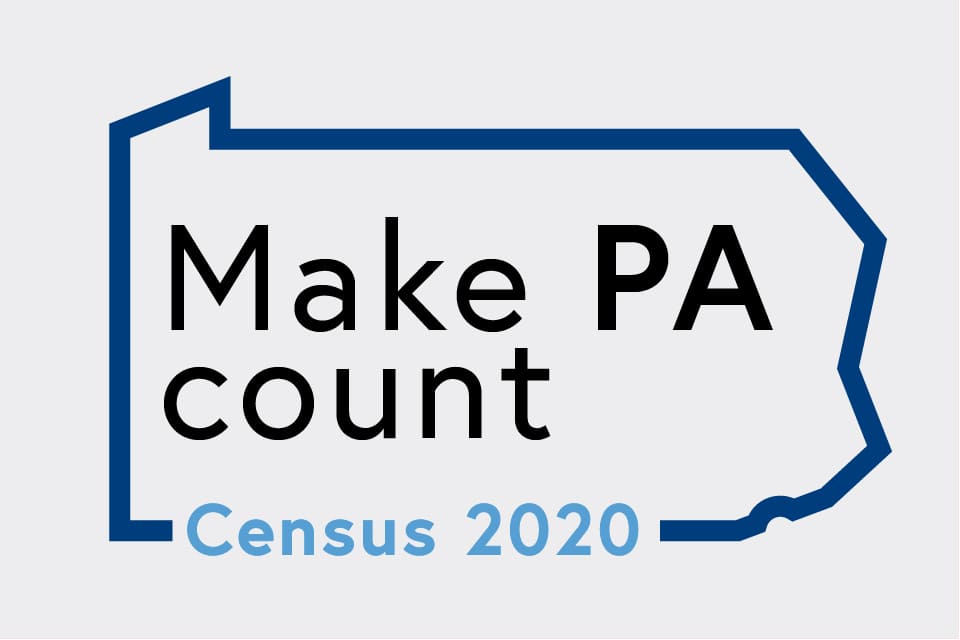
Held every ten years, the United States Census provides critical data for decision-making and funding on the federal, state and local levels. Knowing how vital an accurate count is, Literacy Pittsburgh has partnered with the Jefferson Regional Foundation, City-County Complete Count Committee, and Keystone Counts to spread the word about this year’s process and encourage participation. Many of our students represent historically undercounted populations. Through classroom-based instruction and tutoring lesson plans we are working to familiarize our students with the census and ease any anxieties. Read on to learn what makes this year’s census unique, what to expect, and why it’s so important.
For the first time, the Census will be completed primarily online. Households can choose to complete the Census online, over the phone, or on a paper questionnaire. Between March 12 and March 20, households will receive a postcard with an online link to participate in the 2020 Census. Reminders will be sent throughout the spring. In person follow-up will occur from May to July for households who have not responded to prior attempts to complete their questionnaire.
If an individual is completing the Census online or over the phone, translations are available in 13 languages. Additionally, an explanation guide is available in 59 languages.
Recognizing that online completion of the Census can be a barrier, community hubs are being organized to make it easier for people with limited digital literacy skills or internet access. A list of these locations will be available soon from our Census partners.
The Census asks the number of persons living in the home as of April 1, 2020. It asks about the name, age, sex, date of birth, and race of each person. The Census asks whether you rent or own a home and the relationship of each person to the head of household. It also asks for a phone number to reach you by, in case The Census Bureau has any clarifying questions. The U.S. Census does NOT ask about citizenship or immigration status.
It is important to note that the Census Bureau is required by law to keep information confidential. Results from the census are reported in statistical summary format only, including to other government agencies - no identifying information is shared. Census Bureau employees swear a lifetime oath to protect respondent information. The penalty for wrongful disclosure is up to 5 years imprisonment and/or a fine of $500,000.
What's at Stake for Pennsylvania?
Resources: Federal programs allocate funding based on census data, so an undercount could drastically reduce the resources coming to Pennsylvania for education, health care, housing, veterans, seniors, and much more. This impact will last for the next 10 years.
Funding derived by Census data include program areas such as Medicaid, SNAP, infrastructure, the Low Income Home Energy Assistance Program (LIHEAP), Section 8 Housing, Head Start, and more. Pennsylvania currently receives more than $39.2 billion annually through census-backed programs meaning an undercount could cost our state hundreds of millions of dollars annually and affect our congressional standing.
Representation: Because the U.S. House of Representatives is apportioned according to census data, Pennsylvania could easily lose one or more representatives after 2020 census, especially with an undercount. Because state legislative districts are also drawn based on census data, communities that are undercounted would go underrepresented for the next decade.
Community Support: Aside from funding and political representation, local government, philanthropic, and community leaders also rely on census data to know where to fund, build, or invest. Not being counted means becoming invisible to these decision-makers.
Resources to Learn More
Download a toolkit developed by Jefferson Counts
Keystone Counts statewide coalition
Allegheny County & City of Pittsburgh Complete Count Committee
Map of hard-to-count communities
Literacy Pittsburgh (formerly Greater Pittsburgh Literacy Council) helps create better lives through learning. Recognized as a national leader in adult and family literacy, Literacy Pittsburgh is the largest provider of adult basic education in Allegheny and Beaver Counties. Last year, Literacy Pittsburgh helped more than 4,000 individuals acquire the skills needed to reach their fullest potential in life and participate productively in their communities. Literacy Pittsburgh provides free, personalized instruction in workforce readiness, high school diploma test preparation, digital literacy, English language learning, math, reading, and family literacy through one-to-one and small class instruction. Founded in 1982, it serves local adults through numerous neighborhood locations and its Downtown Pittsburgh Learning Center.


